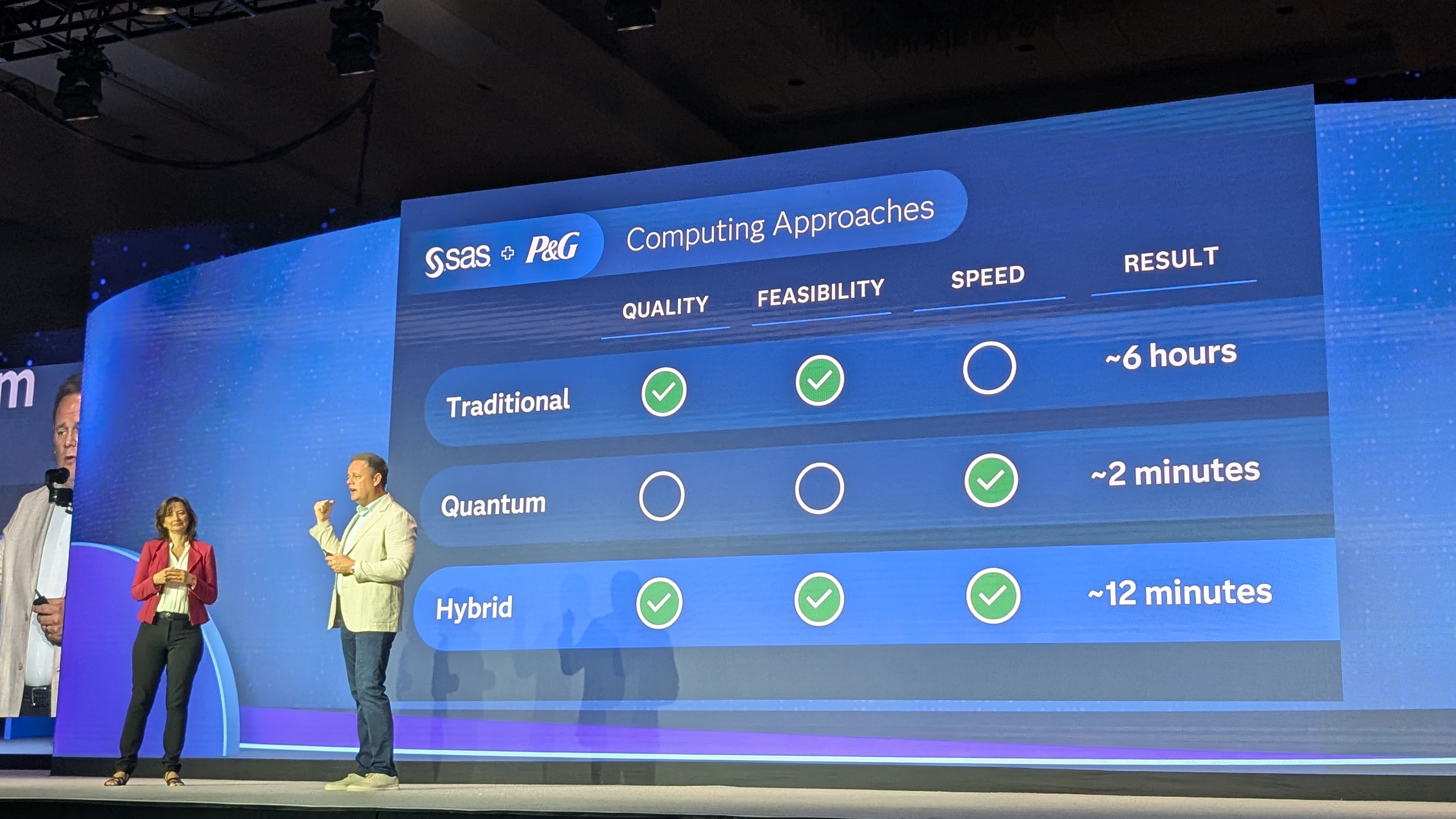What will quantum computing mean for business?
Now that quantum computing is no longer just an experimental theory, it’s time to think about how your company can take advantage of the possibilities

Quantum computing is one of those concepts that sound as if it has come straight out of a comic book, like adamantium, vibranium, or Infinity Stones. But while all these things are the products of creative human imagination, the difference with quantum computing is that it’s very nearly here, and the implications could be much more profound than an almost indestructible metal. Most of us at least know that quantum computing promises processing power many orders of magnitude beyond what we have now. But fewer realise how it changes the nature of computing, and just what that means for business.
What is quantum computing?
What exactly is quantum computing and how does it work? A normal computer is binary, so it calculates using logic gates that have two clearly defined states – 0 or 1. A single unit of binary information is called a bit. A quantum computer, however, operates using quantum states to create a qubit. A quantum-level object, such as a photon or an electron, holds all its possible quantum states at once, a phenomenon known as “superposition”, until it is measured. However, superpositions of one object can be “entangled” with those of another, making them mathematically related, thereby producing a chain of calculations that can all occur simultaneously. A special algorithm can then use these connections to solve complex problems much faster than a traditional computer.
This all remained an exciting theory until the first working example with a single qubit was demonstrated in 1997. IBM then managed 2 qubits in 1998, and the power slowly grew after that. Canadian startup D-Wave unveiled a 28-qubit quantum computer in 2007, which was beginning to approach a useful level. Now quantum computing is becoming commercially available. IBM offers 53 qubits; Google’s Sycamore processor is at the same level; but its Bristlecone processor is at 72 qubits, which is currently the largest demonstrated, although Rigetti claims to have 128 qubits nearing operation.
The target of these commercial developments is something called “quantum supremacy”, which is where the quantum computer can easily outperform the conventional equivalent. There is some debate about how many qubits might be required for this. Alexander Dalzell of the California Institute of Technology in Pasadena first calculated the requirement at over 10,000 qubits, then more like 2,000, and finally ended up with between 208 and 420 qubits depending on the circuit technology used. But Google claimed its 53 qubit processor had already achieved quantum supremacy, by performing a calculation in 200 seconds that would have taken the world’s most powerful supercomputer 10,000 years. This has since been contested by IBM researchers, but shows that we are already reaching the point where quantum computing can emerge from the lab and start being used in the real world.
How can quantum computing be harnessed?
What are the implications of quantum computing and why is it important? The stock example is security. A conventional computer capable of one trillion operations per second, currently equivalent to around half a rack of servers, would take approximately 300 trillion years to crack 2,048-bit RSA encryption – around 22,000 times the current age of the universe. But a quantum computer capable of a mere million operations per second would require just 10 seconds using Shor’s algorithm, which is a polynomial calculation designed for quantum computers. In other words, strong encryption that previously seemed impregnable would provide as much protection as using “password” for your password.
None of the currently operational quantum computers are at this level just yet, but they are delivering performance that is providing useful results already in some areas. Commercial services are starting to become available. IBM, D-wave, and Rigetti are offering cloud interfaces to their quantum computers, and Microsoft is releasing Azure Quantum to provide a set of services that allow developers to start learning about and creating quantum algorithms. GPU-based systems are being used to simulate the behaviour of quantum computing so that software can be developed ready for when powerful enough real services become more widely available.
Where quantum computing can help your business
There are four main areas that are already a focus of attention. Cybersecurity is the obvious first one, because if quantum computers render existing encryption worthless, they can also be used to produce more secure algorithms, random number generators and keys that can’t be defeated by their own processing prowess. The other areas revolve around the capacity quantum computing has for comparing lots of different possibilities and finding the optimum one amongst them or best fit. For example, in financial services this could provide portfolio optimisation, high-frequency trading advantages, and more efficient fraud detection. Goldman Sachs, RBS and Citigroup are already recruiting towards taking advantage of these possibilities.
Logistics is another obvious beneficiary. Traffic management, delivery route optimisation, and other traffic-related problems are finding potential quantum solutions, with Daimler and Honda already aiming to acquire quantum computers for these kinds of activities. Similarly, manufacturing, pharmaceuticals, and materials science can optimise their processes, such as the manufacturing supply chain. Existing quantum computers with just 50 qubits are delivering good results for applications such as protein folding and new drug formula discovery.
There are essentially two types of quantum computing available. Most current offerings are general-purpose gate or circuit-based designs. These can theoretically operate on any kind of quantum algorithm. IBM, Google, and Rigetti offer these kinds of quantum computer. The other type is called an annealing quantum processor, and these can only be used for optimisation algorithms, which find the best solution to a specific problem where the number of options is discrete. D-wave is the main player in this area, and it is claiming to offer 5,000 qubits in 2020, although this can’t be equated with the general-purpose quantum computers, because quantum annealing can’t run Shor’s algorithm so couldn’t be used for cracking encryption, for example. But quantum annealing could be used to solve the “travelling salesman problem”, a format that a lot of common business calculations fit into. For these kinds of computational requirements, it can deliver very useful results already.
However, switching business computing from conventional to quantum computing isn’t a simple matter of code porting. Because the hardware works in a qualitatively different way – massively parallel rather than very fast but essentially serial – functions will need to be redeveloped to take advantage of the possibilities. That’s where a technology partner with specific skills in this area is essential. Reply, for example, is a company that was founded with the purpose of helping businesses get ready for the quantum computing revolution, and has already developed process optimisation and security hardening products for leading Italian companies in railway transportation, banking, telecommunications and energy.
Quantum computing has reached the point where it’s time for businesses to start considering their options so they can gain a competitive advantage. With such a huge amount of computing power on the horizon and some already here, there will be a massive transformation in what is possible as greater amounts of qubits come online. The obsolescence of traditional encryption will just be the beginning, as processes become more efficient and big data-enabled scientific discoveries many orders of magnitude quicker to achieve. What we once called impossible is now merely complex, which will mean companies that start developing now have a clear opportunity to build value, while those that don’t could rapidly be left behind.
Discover how Reply can help your business embrace the power of quantum computing
Sign up today and you will receive a free copy of our Future Focus 2025 report - the leading guidance on AI, cybersecurity and other IT challenges as per 700+ senior executives
ITPro is a global business technology website providing the latest news, analysis, and business insight for IT decision-makers. Whether it's cyber security, cloud computing, IT infrastructure, or business strategy, we aim to equip leaders with the data they need to make informed IT investments.
For regular updates delivered to your inbox and social feeds, be sure to sign up to our daily newsletter and follow on us LinkedIn and Twitter.
-
 IBM is targeting 'quantum advantage' in 12 months – and says useful quantum computing is just a few years away
IBM is targeting 'quantum advantage' in 12 months – and says useful quantum computing is just a few years awayNews Leading organizations are already preparing for quantum computing, which could upend our understanding of linear mathematical problems
-
 Sundar Pichai thinks commercially viable quantum computing is just 'a few years' away
Sundar Pichai thinks commercially viable quantum computing is just 'a few years' awayNews The Alphabet exec acknowledged that Google just missed beating OpenAI to model launches but emphasized the firm’s inherent AI capabilities
-
 Future-proofing cybersecurity: Understanding quantum-safe AI and how to create resilient defenses
Future-proofing cybersecurity: Understanding quantum-safe AI and how to create resilient defensesIndustry Insights Practical steps businesses can take to become quantum-ready today
-
 IBM and AMD are teaming up to champion 'quantum-centric supercomputing' – but what is it?
IBM and AMD are teaming up to champion 'quantum-centric supercomputing' – but what is it?News The plan is to integrate the two technologies to create scalable, open source platforms
-
 SAS thinks quantum AI has huge enterprise potential – here's why
SAS thinks quantum AI has huge enterprise potential – here's whyNews The analytics veteran has shone a light on three crucial quantum partnerships, as it warns organizations must innovate or fall prey to new threats
-
 The UK government wants quantum technology out of the lab and in the hands of enterprises
The UK government wants quantum technology out of the lab and in the hands of enterprisesNews The UK government has unveiled plans to invest £121 million in quantum computing projects in an effort to drive real-world applications and adoption rates.
-
 ‘This is the first event in history where a company CEO invites all of the guests to explain why he was wrong’: Jensen Huang changes his tune on quantum computing after January stock shock
‘This is the first event in history where a company CEO invites all of the guests to explain why he was wrong’: Jensen Huang changes his tune on quantum computing after January stock shockNews Nvidia CEO Jensen Huang has stepped back from his prediction that practical quantum computing applications are decades away following comments that sent stocks spiraling in January.
-
 ‘We’ve created an entirely new state of matter’: Satya Nadella hails Microsoft’s 'Majorana' quantum chip breakthrough
‘We’ve created an entirely new state of matter’: Satya Nadella hails Microsoft’s 'Majorana' quantum chip breakthroughNews Microsoft has unveiled a new chip it says could deliver quantum computers with real-world applications in ‘years, not decades'.



